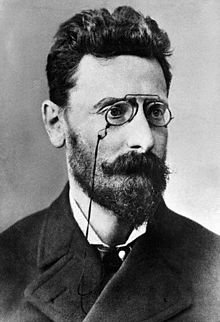
Back Joseph Pulitzer AF جوزيف بوليتزر Arabic جوزيف بوليتزر ARZ Joseph Pulitzer AST Cozef Pulitser AZ جوزف پولیتزر AZB Джоузеф Пулицър Bulgarian জোসেফ পুলিৎজার Bengali/Bangla Joseph Pulitzer BS Joseph Pulitzer Catalan
Joseph Pulitzer | |
|---|---|
 | |
| Member of the U.S. House of Representatives from New York's 9th district | |
| In office March 4, 1885 – April 10, 1886 | |
| Preceded by | John Hardy |
| Succeeded by | Samuel Cox |
| Member of the Missouri House of Representatives from the 5th St. Louis district | |
| In office January 5, 1870 – March 24, 1870 | |
| Preceded by | John Terry |
| Succeeded by | Nicholas M. Bell |
| Personal details | |
| Born | József Pulitzer April 10, 1847 Makó, Kingdom of Hungary |
| Died | October 29, 1911 (aged 64) Charleston, South Carolina, U.S. |
| Citizenship |
|
| Political party | Republican (1870) Liberal Republican (1870–74) Democratic (1874–1911) |
| Spouse |
Katherine "Kate" Davis
(m. 1878) |
| Children | 7 |
| Occupation | Publisher, philanthropist, journalist, lawyer, politician |
| Net worth | US$30.6 million at the time of his death (about 0.09% of US GNP)[1] |
| Signature | |
| Military service | |
| Allegiance | United States of America |
| Branch/service | Union Army |
| Years of service | 1864–1865 |
| Unit | 1st New York Cavalry Regiment |
| Battles/wars | American Civil War Battle of Dinwiddie Court House Battle of Five Forks Third Battle of Petersburg Battle of Sailor's Creek Battle of Appomattox Station Battle of Appomattox Court House |
Joseph Pulitzer (/ˈpʊlɪtsər/ PUUL-it-sər;[2][a] born Pulitzer József, Hungarian: [ˈpulit͡sɛr ˈjoːʒɛf]; April 10, 1847 – October 29, 1911) was a Hungarian-American politician and newspaper publisher of the St. Louis Post-Dispatch and the New York World. He became a leading national figure in the Democratic Party and was elected congressman from New York.
In the 1890s the fierce competition between his World and William Randolph Hearst's New York Journal caused both to develop the techniques of yellow journalism, which won over readers with sensationalism, sex, crime and graphic horrors. The wide appeal reached a million copies a day and opened the way to mass-circulation newspapers that depended on advertising revenue (rather than cover price or political party subsidies) and appealed to readers with multiple forms of news, gossip, entertainment and advertising.
Pulitzer's name is best known for the Pulitzer Prizes established in 1917 as a result of the specified endowment in his will to Columbia University. The prizes are given annually to recognize and reward excellence in American journalism, photography, literature, history, poetry, music, and drama. Pulitzer also funded the Columbia School of Journalism with his philanthropic bequest; it opened in 1912.
- ^ Klepper, Michael; Gunther, Michael (1996), The Wealthy 100: From Benjamin Franklin to Bill Gates – A Ranking of the Richest Americans, Past and Present, Secaucus, New Jersey: Carol Publishing Group, p. xiii, ISBN 978-0-8065-1800-8, OCLC 33818143
- ^ "The Pulitzer prizes – Answers to frequently asked questions". Pulitzer.org. Archived from the original on August 1, 2016. Retrieved August 10, 2009.
Cite error: There are <ref group=lower-alpha> tags or {{efn}} templates on this page, but the references will not show without a {{reflist|group=lower-alpha}} template or {{notelist}} template (see the help page).